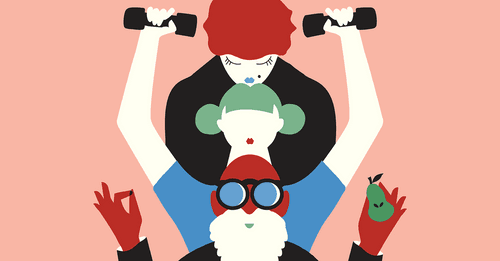How to Build Healthy Habits
Curated from: nytimes.com
Ideas, facts & insights covering these topics:
5 ideas
·173 reads
Explore the World's Best Ideas
Join today and uncover 100+ curated journeys from 50+ topics. Unlock access to our mobile app with extensive features.
In his own life, Dr. Fogg wanted to start a daily push-up habit. He started with just two push-ups a day and, to make the habit stick, tied his push-ups to a daily habit: going to the bathroom. He began by, after a bathroom trip, dropping and doing two push-ups. Now he has a habit of 40 to 80 push-ups a day.
51
38 reads
Many of us fall into end-of-the-day patterns as well. Do you tend to flop on the couch after work and turn on the TV? That might be a good time to do a single daily yoga pose.
Start small.B.J. Fogg, a Stanford University researcher and author of the book "Tiny Habits," notes that big behavior changes require a high level of motivation that often can't be sustained. He suggests starting with tiny habits to make the new habit as easy as possible in the beginning. Taking a daily short walk, for example, could be the beginning of an exercise habit. Or, putting an apple in your bag every day could lead to better eating habits.
51
36 reads
Do it every day.British researchers studied how people form habits in the real world, asking participants to choose a simple habit they wanted to form, like drinking water at lunch or taking a walk before dinner. The study, published in the European Journal of Social Psychology, showed that the amount of time it took for the task to become automatic - a habit - ranged from 18 to 254 days. The median time was 66 days!
51
33 reads
Dr. Wood, author of the book, "Good Habits, Bad Habits: The Science of Making Positive Changes That Stick," calls the forces that get in the way of good habits "friction." In one study, researchers changed the timing of elevator doorsso that workers had to wait nearly half a minute for the doors to close. (Normally the doors closed after 10 seconds.) It was just enough of a delay that it convinced many people that taking the stairs was easier than waiting for the elevator. "It shows how sensitive we are to small friction in our environment," said Dr. Wood. "Just slowing down the elevator got people to take the stairs, and they stuck with it even after the elevator went back to normal timing."
51
33 reads
Take the Healthy-Habits Well Challenge:Now that you know what it takes to start building healthy habits, try the new Well Challenge, which gives you a small tip every day to help you move more, connect with those you love, refresh your mind and nourish your body. Just sign up, and I'll send you a daily email about your next challenge. You can also get these tips and more delivered each day to your smart speaker withMy Well Minute, our new Flash Briefing skill on Alexa. Find out how to get startedhere.
51
33 reads
IDEAS CURATED BY
Tinamarie --'s ideas are part of this journey:
Learn more about habits with this collection
How to challenge assumptions
How to generate new ideas
How to break out of traditional thinking patterns
Related collections
Similar ideas
Read & Learn
20x Faster
without
deepstash
with
deepstash
with
deepstash
Personalized microlearning
—
100+ Learning Journeys
—
Access to 200,000+ ideas
—
Access to the mobile app
—
Unlimited idea saving
—
—
Unlimited history
—
—
Unlimited listening to ideas
—
—
Downloading & offline access
—
—
Supercharge your mind with one idea per day
Enter your email and spend 1 minute every day to learn something new.
I agree to receive email updates
